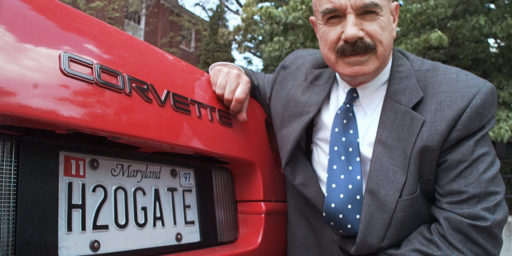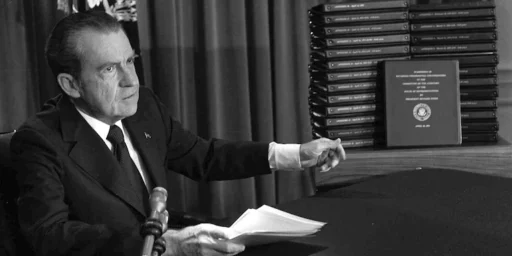Nixon Hatchet Man Turned Evangelical Leader Charles Colson Dead At 80
Charles Colson, who was part of the inner circle of the worst aspects of the Nixon Administration and spent his later life as a proponent for men in prison, died yesterday at the age of 80:
Charles W. Colson, who as a political saboteur for President Richard M. Nixon masterminded some of the dirty tricks that led to the president’s downfall, then emerged from prison to become an important evangelical leader, saying he had been “born again,” died on Saturday. He was 80.
The cause was complications of a brain hemorrhage, according to Prison Fellowship Ministries, which Mr. Colson founded in Lansdowne, Va. He died at Inova Fairfax Hospital in Falls Church, Va., and lived in Naples, Fla., and Leesburg, Va.
Mr. Colson had brain surgery to remove a clot after becoming ill on March 30 while speaking at a conference, according to Jim Liske, the group’s chief executive.
Mr. Colson was sent to prison after pleading guilty to obstructing justice in one of the criminal plots that undid the Nixon administration. After having what he called his religious awakening behind bars, he spent much of the rest of his life ministering to prisoners, preaching the Gospels and forging a coalition of Republican politicians, evangelical church leaders and Roman Catholic conservatives that has had a pronounced influence on American politics.
It was a remarkable reversal.
Mr. Colson was a 38-year-old Washington lawyer when he joined the Nixon White House as a special counsel in November 1969. He quickly caught the president’s eye. His “instinct for the political jugular and his ability to get things done made him a lightning rod for my own frustrations,” Nixon wrote in his memoir, “RN: The Memoirs of Richard Nixon.” In 1970, the president made him his “political point man” for “imaginative dirty tricks.”
“When I complained to Colson, I felt confident that something would be done,” Nixon wrote. “I was rarely disappointed.”
Mr. Colson and his colleagues “started vying for favor on Nixon’s dark side,” Bryce Harlow, a former counselor to the president, said in an oral history. “Colson started talking about trampling his grandmother’s grave for Nixon and showing he was as mean as they come.”
As the president’s re-election campaign geared up in 1971, “everybody went macho,” Mr. Harlow said. “It was the ‘in’ thing to swagger and threaten.”
Few played political hardball more fiercely than Mr. Colson. When a deluded janitor from Milwaukee shot Gov. George C. Wallace of Alabama on the presidential campaign trail in Maryland in May 1972, Nixon asked about the suspect’s politics. Mr. Colson replied, “Well, he’s going to be a left-winger by the time we get through.” He proposed a political frame-up: planting leftist pamphlets in the would-be killer’s apartment. “Good,” the president said, as recorded on a White House tape. “Keep at that.”
Mr. Colson hired E. Howard Hunt, a veteran covert operator for the Central Intelligence Agency, to spy on the president’s opponents. Their plots became part of the cascade of high crimes and misdemeanors known as the Watergate affair.
The subterfuge began to unravel after Mr. Hunt and five other C.I.A. and F.B.I. veterans were arrested in June 1972 after a botched burglary and wiretapping operation at Democratic National Committee headquarters at the Watergate office complex in Washington. To this day, no one knows whether Nixon authorized the break-in or precisely what the burglars wanted.
“When I write my memoirs,” Mr. Colson told Mr. Hunt in a November 1972 telephone conversation, “I’m going to say that the Watergate was brilliantly conceived as an escapade that would divert the Democrats’ attention from the real issues, and therefore permit us to win a landslide that we probably wouldn’t have won otherwise.” The two men laughed.
That month, Nixon won that landslide. On election night, the president watched the returns with Mr. Colson and the White House chief of staff, H. R. Haldeman. “I couldn’t feel any sense of jubilation,” Mr. Colson said in a 1992 television interview. “Here we were, supposedly winning, and it was more like we’d lost.”
“The attitude was, ‘Well, we showed them, we got even with our enemies and we beat them,’ instead of ‘We’ve been given a wonderful mandate to rule over the next four years,’ ” he said. “We were reduced to our petty worst on the night of what should have been our greatest triumph.”
The Watergate operation and the dirty tricks campaign surrounding it led to the criminal indictments and convictions of most of Nixon’s closest aides. On June 21, 1974, Mr. Colson was sentenced to prison and fined $5,000. Nixon resigned seven weeks later after one of his secretly recorded White House tapes made clear that he had tried to use the C.I.A. to obstruct the federal investigation of the break-in.
Mr. Colson served seven months after pleading guilty to obstructing justice in the case of Daniel Ellsberg, a former National Security Council consultant who leaked the Pentagon Papers, a secret history of the Vietnam War, to The New York Times. In July 1971, a few weeks after the papers were published, Mr. Colson approved Mr. Hunt’s proposal to steal files from the office of Mr. Ellsberg’s psychiatrist. The aim was “to destroy his public image and credibility,” Mr. Hunt wrote.
If that’s where things had ended, then Colson likely would have left prison and turned out not unlike someone like G. Gordon Liddy, who has spent most of his life denying that he and the Nixon people had ever really done anything wrong, and moving further into the depths of the far right. Colson, however, took a different path:
In 1976, he founded Prison Fellowship Ministries, which delivers a Christian message of redemption to thousands of prison inmates and their families. In 1983, he established Justice Fellowship, which calls itself the nation’s largest religion-based criminal justice reform group. In 1993, he won the $1 million Templeton Prize for Progress in Religion, and donated it to his ministries.
By the end of the 1990s, Mr. Colson had become a leading voice in the evangelical political movement, with books and a syndicated radio broadcast. He helped form a conservative coalition of leaders from the Republican Party, the Protestant evangelical community and the Catholic Church. The Catholics and the evangelicals, once combatants over issues of religious doctrine, now joined forces in fights over abortion rights and religious freedom, among other issues.
Mr. Colson also reached out to the Rev. Richard John Neuhaus, a Catholic theologian who edited the journal First Things and who had warned of a coming tide of secularism in his book “The Naked Public Square.” They inaugurated a theological dialogue that resulted in the publication of the document “Evangelicals and Catholics Together” in 1994.
Mr. Colson said that he had initially gotten hate mail from evangelicals because of that initiative, and that the Prison Fellowship had lost a million dollars in donations. But the manifesto, pushing for religion-based policies in government, cleared the path for a political and cultural alliance that has reshaped the political debate in America, adding fuel to a rightward turn in the Republican Party and a rising conservative grass-roots movement.
In 2000, Mr. Colson was a resident of Florida when Gov. Jeb Bush restored his rights to practice law, vote and serve on a jury — all of them having been lost with his federal felony conviction. “I think it’s time to move on,” Mr. Bush said at the time. “I know him. He’s a great guy.”
(…)
In 1973, while looking for work after leaving the White House and fearing that he was going to wind up in jail, Mr. Colson got into his car and found himself in the grip of the spiritual crisis that led to his conversion. “This so-called White House hatchet man, ex-Marine captain, was crying too hard to get the keys into the ignition,” he remembered. “I sat there for a long time that night deeply convicted of my own sin.”
Whether Colson redeemed himself is not for me, or anyone else, to judge but there were few members of the Nixon inner circle to at least come close.






Bullsh!t, Doug. It is for us to judge and to do otherwise is cowardice.
This makes him a complete slime ball to me, and every bit as bad as any Ayatollah.
As OzarkHillbilly points out, this is bullshit. He went from a right wing activist to a different flavour of right wing activist.
By their works will you know them. Name something, anything, that Colson contributed to humanity that was positive. I only regret HST didn’t live long enough to write an obituary for him.
This nonsense of “Oh but he says Jesus is his friend now” is incredibly unhelpful. Call a monster a monster. And Colson was a monster.
@swearyanthony: Oh, I think Colson did real work for society in his prison ministry. And I say that as an anti-theist.
In the film All the President’s Men one of the characters states “There’s a cartoon on (Charles) Colson’s wall…. the caption reads……. When you got ’em by the balls…… their hearts and minds will follow……..”
Has this ever been confirmed or was it a film writer’s fantasy?.
@James Joyner:
He also did a lot of damage. His program was sued successfully on multiple occasions because prisons involved in this program frequently coerced people into participating by punishing prisoners who refused to convert with loss of priveleges. And how many millions did he make doing it? He didn’t actually reform, he just found himself a new scam.
And as for all the talk of redemption, why did he need Jesus do redeem him to begin with? Most of us don’t get involved in crimes like his simply because we know its wrong. And it’s not like he realized this on his own and sought to voluntarily make right his wrongs. No, it was only after he was caught that he “saw the light”. How conenient.
@James Joyner: sorry James, but i have read far too many cases of prisoners being forced into his Christian sessions in order to get better treatment. The first amendment be damned, there are far too many prisons where you need to toe the line he provided.
If his prison ministry was about rehabilitation that would have been ok. It wasn’t. It really really wasn’t. It was theocracy.
@Stormy Dragon: What you said. He would pitch his program to a prison CEO and the prisoners were obliged to participate.
He was a genuine monster, and I find it beyond bizarre that obituary writers feel the need to try and be nice to his memory.
People who pooh-pooh mentions of William Ayers and Bernardine Dohrn have NO business rendering this kind of judgment on Colson.
After all, unlike the Weather Underground or Fast and Furious or Chappaquiddick, nobody died over Watergate.
@Jenos Idanian:
So apparently it’s perfectly fine to be a thief as long as you live next door to a murderer.
@Stormy Dragon: No, I am saying that if you have a thief next door to a murderer, to call the thief the worst person in the world is really stupid.
I have read one of Colson’s books, It was very well written and inspiring.
So Doug still refuses to judge this particular piece of shit….
Doug, you need a set of balls.
Who is doing that? What is dismissed about William Ayers is the guilt by association meme involving him and the President…oh, and mentioning Ayers doesn’t change the fact that Colson was a reprehensible person…